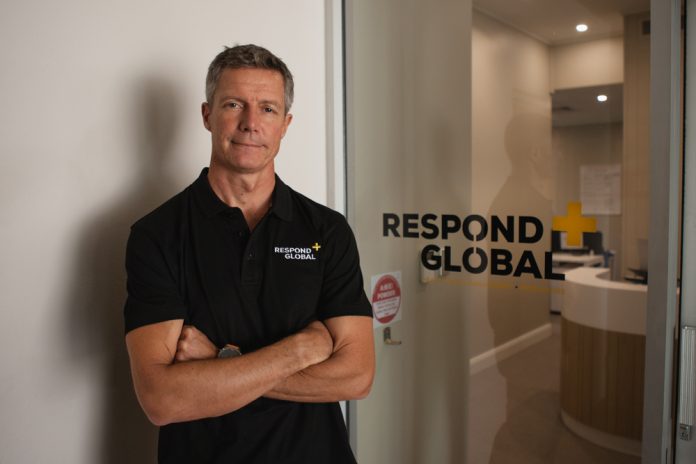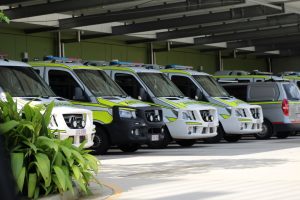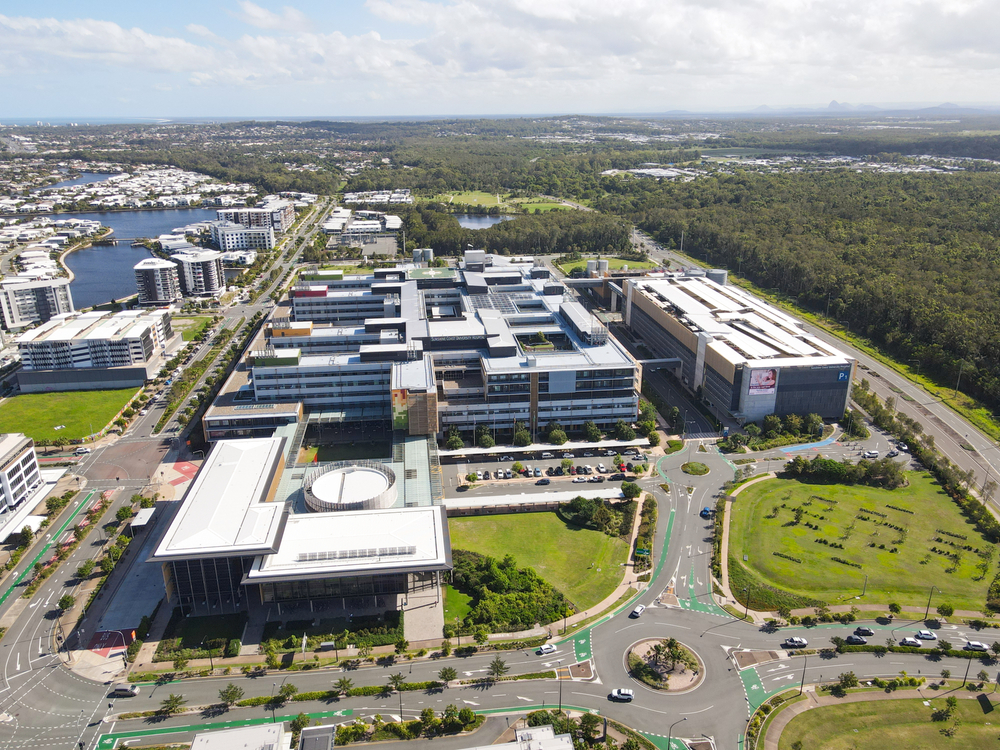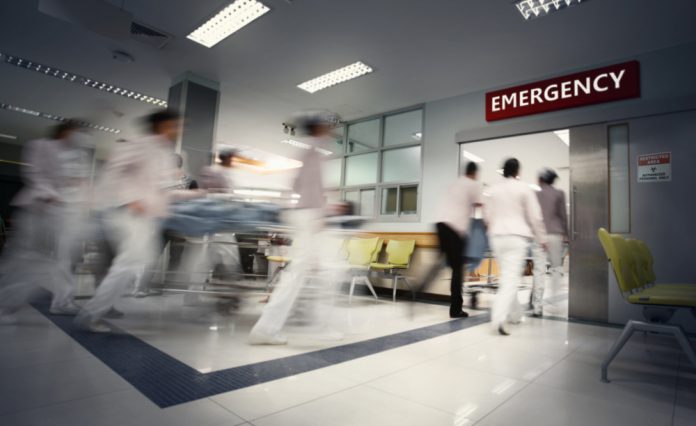The Sunshine Coast’s key hospital is gearing up for a COVID outbreak as early as January amid concerns that chronic “bed block” could cause chaos when the virus is circulating in the community.
An expert has predicted Queensland could expect to stabilise with about 200 infections a day after borders open on December 17.
Health crisis emergency manager, Dr Ian Norton, said about 20 of those daily cases would require hospitalisation, which would not place a huge strain on hospitals except for the fact that the system was already stretched.
While Sunshine Coast University Hospital (SCUH) is getting ready for an outbreak in early January, according to modelling the more likely timeframe for a surge in cases would be between late January and March.
A January outbreak would also coincide with the Coast’s peak summer holiday period when the population swells by about 150,000 visitors to more than 500,000 people, which could push the Emergency Department (ED) and hospital to the limit.
Preparations include ensuring the ED is ready for a spike in presentations and SCUH’s specialist COVID-19 ward is fully staffed.
However doctors, nurses and paramedics have expressed serious concerns about SCUH’s ability to handle extra patients as it is already often “bursting at the seams’’.
They reveal that “bed block’’, also known as “access block”, is common at SCUH. This is a term used to describe significant delays in patient flow from the Emergency Department to other areas within a hospital. This can be due to high numbers of patients, processing/staffing issues and no beds being available.
It is important to note that Queensland Health statistics show that not all Queenslanders are using hospital emergency departments correctly, with many people presenting each year with non-emergency health concerns. This can mean that EDs and their staff aren’t able operate to their full potential, and may put seriously ill patients at risk.
There are concerns that the resources diverted to COVID patients will deplete other areas of the hospital and also see those patients already waiting for elective surgery face even longer delays.
Questions also remain over whether the health service will have to plug gaps left by unvaccinated workers who have stopped working, or how it would cope if rosters were impacted by some staff falling ill due to COVID.

Dr Norton, the founder of Respond Global: Health Crisis Emergency Management in Noosa, said the problem for SCUH wouldn’t be the number of COVID patients needing medical care, but the already clogged hospital system.
“I think at this stage our system should be able to cope with the number who require intensive care,” he said. “It doesn’t answer the problem that we already had a stressed public health system before COVID. In general, it’s a problem that we need to tackle across the whole hospital system not just blame the ED or blame the ambulances.
“How do we somehow open up new beds upstairs for this next six months or so, so that we can really surge our capacity and make sure people are not waiting for long periods of time on the ramp of the hospital?
“The answer’s not to become a hermit state and never open our borders. The answer is to try and fix the bed block and that’s a hard one because they’ve been trying to fix bed block for 10 years or more.”
Dr Norton also urged Queensland Health to ditch its policy of admitting every positive case to hospital, warning it would add even more “chaos”.
Help keep independent and fair Sunshine Coast news coming by subscribing to our free daily news feed. All it requires is your name and email. See SUBSCRIBE at the top of this article.
Since the start of the pandemic, the Sunshine Coast Hospital and Health Service has treated 107 patients with COVID.

Chief executive Dr Peter Gillies said the health service had been responding to the pandemic for almost two years and was ready for what would come next.
“SCUH was constructed with purpose-built pandemic wards so is well equipped to care for these patients and we also have well-developed plans in place to expand our emergency department and intensive care unit to cope with any surge in COVID-19 patients, should this be required,” he said in a statement.
“The plans involve a tiered response which may require changes in services such as rescheduling of elective surgeries if there are large numbers of COVID-19 patients requiring admission to our hospitals.”
Patients with COVID-19 are admitted to a dedicated COVID-19 ward.
Dr Gillies said all staff on that ward were trained and used personal protective equipment at all times.
Treatment for COVID-19 patients included oxygen therapy and medications while the sickest patients are transferred to the intensive care unit, he said.
Hospital already stretched
However, insiders warn even without COVID-19, holiday periods and staffing issues like the recent suspension of unvaccinated workers, there is often a scramble for staff, particularly nurses.
Sundays and Mondays have become extremely busy days and a recent snapshot showed the massive pressure the ED is under.
In response to questions from Sunshine Coast News, a SCUH spokesperson confirmed that on Sunday, October 24, and Monday, October 25, a total of 487 patients attended the ED and targets were not met on either day in relation to admitting patients from the ED to a ward bed within four hours of their arrival.
Do you have an opinion to share? Submit a Letter to the Editor with your name and suburb at Sunshine Coast News via: news@sunshinecoastnews.com.au
On those two days, only 74 of the 487 patients were admitted within the benchmark timeframe.
In one case, the family of an elderly woman with heart issues and a broken foot said she was ramped for nine hours and unable to get a ward bed.

Relatives were encouraged to push for a private bed instead as the woman was insured. She gained one two days later. They were also told there were no surgeons available to operate on the broken foot and, again, private was the way to go.
“They were pushing private pretty hard and saying that if we did that, it would free up a public bed for someone else … every staff member we spoke to said the hospital was full to capacity, staff were working extra shifts and described SCUH as having a bed deficit,’’ the relative said.
In its response, SCUH said there were a number of factors impacting on both the availability and demand for an inpatient bed, including waiting for the previous patient to leave the bed space.
“Our Patient Access and Coordination Hub (PACH) stocktakes the beds across the HHS three times per day at 7am, 1pm and 4pm. Clinicians in PACH manage our bed requirements 24/7.
It said staff could be increased if necessary: “Our casual pool plays a vital role in supporting the health service to maintain quality care where there are staff absences due to illness or emergent leave.’’
With regard to ED pressures, SCUH said: “Each year presentations at emergency departments across Sunshine Coast Hospital and Health Service are increasing by about eight per cent. This includes a 3.5 per cent increase in ambulance arrivals at Sunshine Coast University Hospital (SCUH).’’





